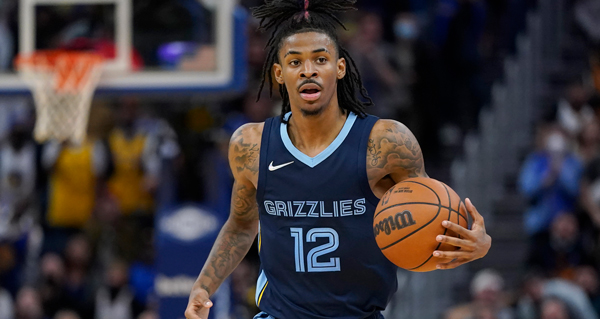After watching the sludgy, plodding early Tuesday evening slobberknocker that was Game 2 of the Milwaukee Bucks and Boston Celtics' second-round series, taking in a late-night contest between the Golden State Warriors and Memphis Grizzlies felt like abusing a controlled substance. This visceral lift of the difference in pace was not illusory: the Western Conference semifinals game in Memphis game saw 186 shots go up, with just 153 hoisted in Boston. While happening at a much greater speed, though, the game retained the beautiful postseason ugliness—very occasionally injected with hard-earned grace—that was established by the prior match-up.
No one was more responsible for these moments of gold within a two-way blitzkrieg of frustration than Ja Morant. Morant, usually the smallest player on the court, has a relationship with angles and the air that makes him seem otherwise. There are the impossibly obtuse perspectives he tosses lay-ups from on the move, and then there are the drive-stop-and-rise floaters taken from an unblockable apex. The Grizzlies were able to make the Warriors play their way, with the ball pinging back and forth between bodies moving more aggressively than their brains can process, producing a situation in which their size and athleticism can take indomitable root. Their stressfully active frontcourt of Jaren Jackson Jr. and Brandon Clarke is a big part of this edge, but it's Morant's zenith-level artistry that consistently puts Memphis over the top in these frenzied brawls.
It is Morant's touch, not his athleticism, that is his secret ingredient. Every several years, we do see someone who can move like he moves, but it's only once a generation or so that they can also put a gossamer coating all over the ball as they release it from such unusual places, allowing it to take its time gently falling into the net. Morant can leap and decelerate in frankly violent ways, that humiliate the opposition, but it's his ability to also end these whirlwind sequences gently that creates such terrifying defensive quagmires.
The veteran Warriors can't handle them at the moment; Morant had 47 points in the Grizzlies' Game 2 win, with 18 in the fourth quarter as he strutted into the painted area for reliable baskets during crunch time. It didn't help Golden State that their best option for guarding Morant, Gary Payton II, was injured for the rest of the series by the reckless Dillon Brooks, three minutes into the game. Payton's departure, Brooks' ejection, the injured back of crucial Morant running mate Desmond Bane, and the extra flourish of Draymond Green's bruised and swollen face, puffed up around his right eye, all made the contest seem much more war-like than even an especially nasty playoff game typically does.
Perhaps that's because this Grizzlies-Warriors series projects, more and more with each game, as a battle for the very prized thing that is the future. Memphis seems destined to figure heavily there either way, but the grizzled three-time champions are not prepared to concede the present after spending the past couple of seasons licking wounds and rebuilding around their core of Green, Stephen Curry, and Klay Thompson, following a grueling seven-year run that began with them as upstart darlings upsetting the status quo just like the Grizzlies are right now, and then ratched up into a half-decade of dynasty. In Game 3, with the series tied at 1-1 and heading to Northern California, the Warriors will surely be motivated to demonstrate that those brilliant years aren't over just yet.
Against the limping Denver Nuggets in the first round, the Warriors looked every bit like the world-beater that rose to global attention, especially with the extra injection of dazzling offense that rising 22-year-old Jordan Poole added to their arsenal. Poole, as much as anyone on the Grizzlies, plays like he is demanding that the future is right now. His place in the spotlight widened with an excellent Game 1 performance in which he played nearly up to Morant's level, but he struggled to guard Ja after Payton's injury, garnering five personal fouls and getting lost in the paint, while conceding minutes, touches, and shots to Klay Thompson on the other end. And no one looked less like they belonged on that chaotic court than Thompson.
After missing two full seasons from injury, the 32-year-old returned to Golden State's lineup this winter, with an impressively passable approximation of the three-and-D supremacy he was once known for. The moment when he would be pressed to do more than just a pretty good job, and re-become his All-NBA self, was sure to arrive though, and now it has. In Game 3, Thompson will need to do better than 5-for-19 shooting, with those numbers not really telling the story of how forced and unnatural his performance was. Klay ceding more of the offense to Poole may help the Warriors, but no matter what they will need to shape into the rhizomatic offensive organism that they were for so long, and still looked like just recently. Thompson playing more within himself is key to that effort.
The Grizzlies might prove too disruptive for such a return to form, and again impose a colorful uptempo destructiveness onto the arriving match-ups that ultimately favors their grip. Curry, who is less the hypnotically dancing volume three-point prince that he used to be and more of a tough, rugged game manager who finds victories in all kinds of odd corners, will be put to the greatest test yet of this, the beginning of his historic career's late phase. Morant will try to stop that in its tracks, and what we're likely to see is nothing short of a fight over who gets a bigger place in the next part of NBA history.



